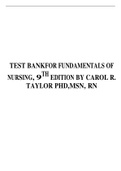TEST BANK FOR FUNDAMENTALS OF NURSING, 9TH EDITION BY CAROL R. TAYLOR PHD, MSN, RN TABLE OF CONTENTS Unit I Foundations of Nursing Practice • Chapter 1 Introduction to Nursing • Chapter 2 Theory, Research, and Evidence -Based Practice • Chapter 3 Health, Wellness, and Health Disparities • Chapter 4 Health of the Individual, Family, and Community • Chapter 5 Cultural Diversity • Chapter 6 Values, Ethics, and Advocacy • Chapter 7 Legal Dimensions of Nursing Practice • Chapter 8 Communication • Chapter 9 Teaching and Counseling • Chapter 10 Leading, Managing, and Delegating Unit II Health Care Delivery • Chapter 11 The Health Care Delivery System • Chapter 12 Collaborative Practice and Care Coordination Across Settings Unit III Person -Centered Care and the Nursing Process • Chapter 13 Blended Competencies, Clinical Reasoning, and Processes of Person - Centered Care • Chapter 14 Assessing • Chapter 15 Diagnosing • Chapter 16 Outcome Identification and Planning • Chapter 17 Implementing • Chapter 18 Evaluating • Chapter 19 Documenting and Reporting • Chapter 20 Nursing Informatics Unit IV Promoting Health Across the Lifespan • Chapter 21 Developmental Concepts • Chapter 22 Conception Through Young Adult • Chapter 23 The Aging Adult Unit V Actions Basic to Nursing Care • Chapter 24 Asepsis and Infection Control • Chapter 25 Vital Signs • Chapter 26 Health Assessment • Chapter 27 Safety, Security, and Emergency Preparedness • Chapter 28 Complementary and Integrative Health • Chapter 29 Medications • Chapter 30 Perioperative Nursing Unit VI Promoting Healthy Physiologic Responses • Chapter 31 Hygiene • Chapter 32 Skin Integrity and Wound Care • Chapter 33 Activity • Chapter 34 Rest and Sleep • Chapter 35 Comfort and Pain Management • Chapter 36 Nutrition • Chapter 37 Urinary Elimination • Chapter 38 Bowel Elimination • Chapter 39 Oxygenation and Perfusion • Chapter 40 Fluid, Electrolyte, and Acid–Base Balance Unit VII Promoting Healthy Psychosocial Responses • Chapter 41 Self-Concept • Chapter 42 Stress and Adaptation • Chapter 43 Loss, Grief, and Dying • Chapter 44 Sensory Functioning • Chapter 45 Sexuality • Chapter 46 Spirituality Chapter 1, Introduction to Nursing An oncology nurse with 15 years of experience, certification in the area of oncology nursing, and a master’s degree is considered to be an expert in her area of practice and works on an oncology unit in a large teaching hospital. Based upon this description, which of the following career roles best describes this nurse’s role, taking into account her 1. qualifications and experience? A) Clinical nurse specialist B) Nurse entrepreneur C) Nurse practitioner D) Nurse educator Ans: A Feedback: A clinical nurse specialist is a nurse with an advanced degree, education, or experience who is considered to be an exper t in a specialized area of nursing. The clinical nurse specialist carries out direct patient care; consultation; teaching of patients, families, and staff; and research. A nurse practitioner has an advanced degree and works in a variety of settings to deliver primary care. A nurse educator usually has an advanced degree and teaches in the educational or clinical setting. A nurse entrepreneur may manage a clinic or health -related business. What guidelines do nurses follow to identify the patient’s health care needs and strengths, to establish and carry out a 2. plan of care to meet those needs, and to evaluate the effectiveness of the plan to meet established outcomes? A) Nursing process B) ANA Standards of Professional PerformancNe C) Evidence -based practice guidelines D) Nurse Practice Acts Ans: A Feedback: The nursing process is one of the major guidelines for nursing practice. Nurses implement their roles through the nursing process. The nursing process is used by the nurse to identify the patient’s health care needs and strengths, to establish and carry ou t a plan of care to meet those needs, and to evaluate the effectiveness of the plan to meet established outcomes. Which of the following organizations is the best source of information when a nurse wishes to determine whether an 3. action is within the scope of nursing practice? A) American Nurses Association (ANA) B) American Association of Colleges in Nursing (AACN) C) National League for Nursing (NLN) D) International Council of Nurses (ICN) Ans: A Feedback: The ANA produces the 2003 Nursing: Scope and Standards of Practice , which defines the activities specific and unique to nursing. The AACN addresses educational standards, while the NLN promotes and fosters various aspects of nursing.




